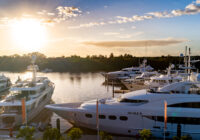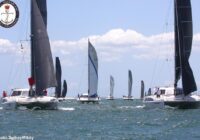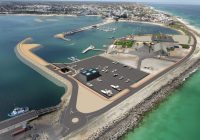Everything you need to know about Rolex Fastnet
It’s almost time again for the Rolex Fastnet Race which starts on Saturday 22nd of July at Cowes. This year, representing CYCA in the 50th edition are four entries from Australia. There’s Noakes Group CEO Sean Langman who’ll race Maluka of Kermandie, Jiang Lin in her new JPK 10.30 Min River and Jules Hall’s two-handed J/99 entry, Disko Trooper racing alongside Paddy Broughton’s Kialoa II.
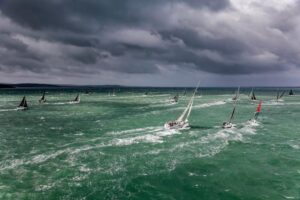
The race can be brutal and fierce competition is expected. The course starts in Cowes on the Isle of Wight, rounds the mysterious Fastnet rock in southern Ireland, and sends crews back to finish in Normandy, France. Following a course of approximately 625 nautical miles (719 mi; 1,158 km) Rolex Fastnet is revered as one of the classic, big offshore races.
Founded in 1925, this exalted biennial offshore yacht race is organised by the Royal Ocean Racing Club (RORC) of the United Kingdom. It attracts courageous sailors from all over the world, and is brought to life with the assistance of the Royal Yacht Squadron in Cowes, and the City of Cherbourg in France.
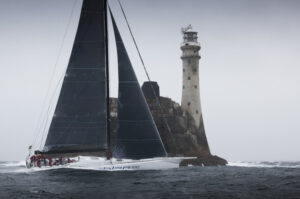
Last race, Tom Kneen’s JPK 11.80 Sunrise was crowned overall winner in a tough 2021. Speaking to Rolex of the win, a day after completing the course in Sunrise’s corrected time of 4 days, 6 hours, 45 minutes 4 secondsm Kneen said. “I’ve had 24 hours to reflect on the race after we finished yesterday, and it really is all about the people, the amazing team that sailed with me, and my incredible partner Francesca who has done so much to make this happen.” In 2021 the race trophy winner was Harry J. Heijst when his S&S 41 Winsome took the honour. Winsome will return in 2023, along with another Rolex Fastnet Race regular Ben Morris, in his Brixham-based Swan 55 Lulotte. Lulotte was the 2019 winner and Morris will now compete in his tenth Fastnet in 2023.
From its inception, the Fastnet Race has proven highly influential in the growth of offshore racing. It remains closely linked to advances in yacht design, sailing technique and safety equipment. In 2021 the first day was brutal, thirty boats had retired by nightfall, with many more following suit.
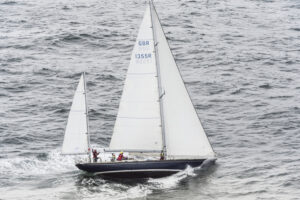
Taking place in late July and August, the race is often difficult, as the course is provided with Westerlies that can be strong, to gale force in strength. With incredible speed potential Fastnet is a test of a competitor’s inshore and offshore skills, along with boat and crew preparation. The succession of low-pressure systems which advance on Ireland and Britain across the North Atlantic, provide a constantly moving weather pattern for which Rolex Fastnet navigators must plan. These depressions are mostly centered on the north of the English Channel. A crew’s knowledge of when and where meteorological disturbances are likely to occur, and how to use them to their best advantage, is the key to success in the Fastnet race.
Rounding Ireland’s Teardrop
Fastnet Rock is a rocky outcrop, with a lighthouse that holds a power and mystery dating back centuries. This strange, isolated rock forms the southernmost tip of Irish soil, located just 10 nautical miles from Baltimore, and 4 miles from Cape Clear. For ships crossing the Atlantic it can be the first, or last, sight of Europe. Often covered in low cloud, and beset by furious winds and seas from rolling Atlantic lows, this dastardly rock was once a place where ships could – and did– come to grave ends. This rock adds a magnetic power to the race, which has long made it carry a strong allure for ardent sailors. Since 2001 the Fastnet Race has been sponsored by the Swiss watch manufacturing company Rolex, the coveted Race prize is known as the Rolex Fastnet Challenge Cup. Rolex wish all their Australian competitors the best of luck.
For more information visit rolexsydneyhobart.com







